When considering which type of education you would like your child to experience, you're going to run into some tough choices. If private school is an option for your family, the main choices are pretty much Reggio, Charlotte Mason, Steiner (Waldorf), and Montessori.
They are all amazing methods, but they do have differences. I will compare Montessori and Reggio in another post, as well as discuss Mason.
Right now, I'd like to help you make the decision: Montessori or Waldorf.
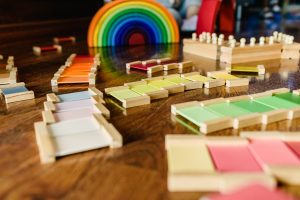
First, let's talk about the similarities between the two methods.
The similarities between Montessori and Waldorf
1- Both methods are based on thorough research of childhood development.
2- Both methods categorize stages of childhood development. Waldorf refers to them as “stages” and Montessori refers to them as “planes“.
3- Both focus on practical activities that provide children with the opportunity to learn through their senses.
4- Both classrooms are designed with natural, appealing materials.
5- Both methods discourage the use of screen media in the primary years.
If you were to look at a Waldorf classroom, you would notice many similarities to a Montessori classroom. You would see some differences, as well.
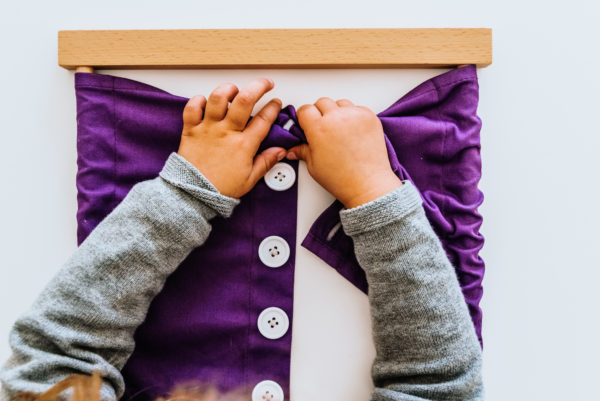
The difference between Montessori and Waldorf
The major difference between the Montessori and Steiner methods is that Montessori education is child-centered, while Steiner education is teacher-centered. Montessori classrooms consist of children of mixed ages.
This is so children can learn from and teach each other. Waldorf schools follow a typical grade structure and the teacher plays a more central role in the classroom.
Waldorf schools also encourage free, open-ended play, instead of giving children items that serve mainly educational purposes.
Steiner schools focus on fairy-tales and make-believe, while Montessori schools encourage a child's imagination through real-life activities.
Montessori materials and activities are designed for the purpose of letting the child play, with built-in control of error, for a designated purpose. (The child is often unaware of the purposes of the activities.)
If you are torn between the two, consider your child.
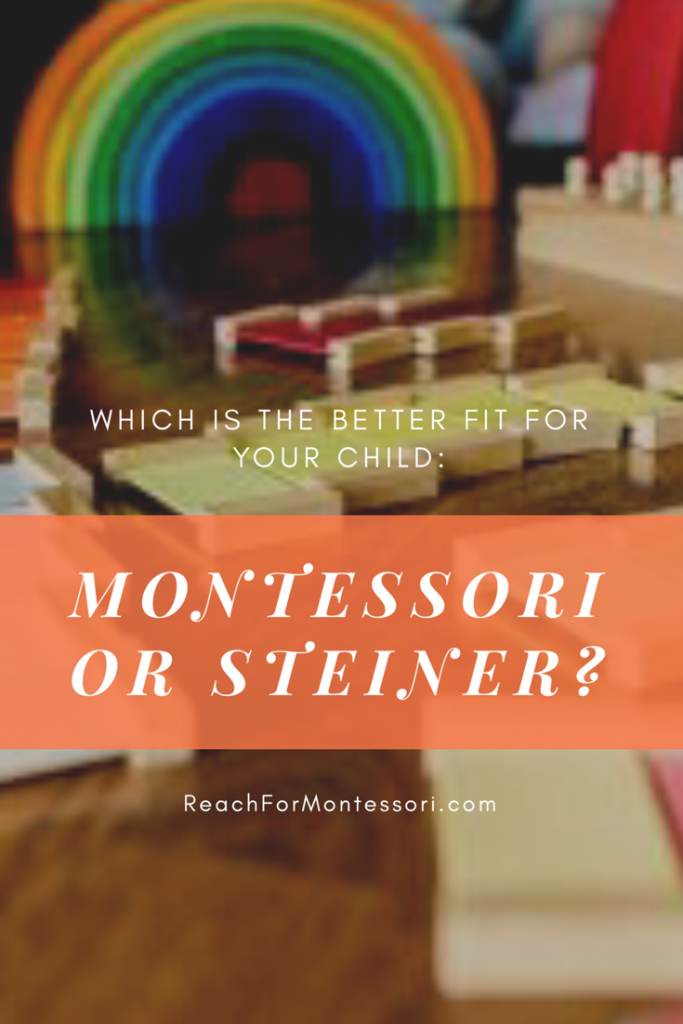
What's important to them? My daughter was very rooted and didn't do much fantastic play.
She wanted to do what I was doing, instead of playing. For my daughter, I would choose Montessori.
My 2-year-old can stick up an index finger from each hand and play “dinosaurs” on his own for an hour or longer.
He seems to enjoy a mix of practical life and imaginative play, and he asks for input in his play.
For him, I would consider I might consider a Waldorf education, however, I am still going to follow the Montessori philosophy while teaching him at home during the primary years, as those are my qualifications and private school is not an option for our family.
There are also the racist roots of Steiner that I, as well as many others, find extremely bothersome. Montessori is rooted in the exact opposite of this.
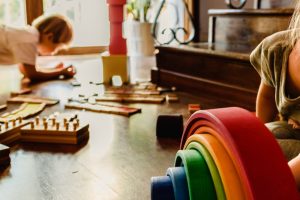
Montessori, Waldorf, and fantasy play
There is a common misconception that Montessori discourages fantasy and imagination. This is simply untrue.
Montessori does encourage children to experience the world in a concrete way before introducing fantastic stories and books, but children are allowed all the imagining and fantasizing they can muster up.
Montessori does discourage teacher/parent-led stories about fairies, dragons, and that sort of thing.
This would be another key difference between the two methods.
Since there is no rock-solid evidence that favors one method over the other, you can use the Montessori “follow the child” principle, and do what it seems your child needs.
As far as what you do at home, you may find that your child doesn't appreciate having to choose toys or learning methods from one particular category.
Children are individuals. We, as parents, have our own preferences, but we need to be careful not to impose our preferences on them.
Cheers and don't forget to subscribe!
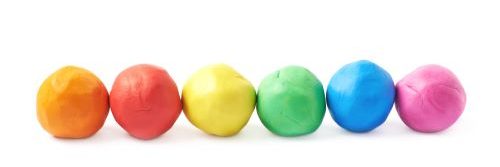
Pingback: Montessori and RIE: Compatible or not? — The Montessori-Minded Mom
There are also the racist roots of Steiner that I, as well as many others, find extremely bothersome.
LOL!
Thank you for this. I must please add, since this seems like an objective comparing of Waldorf and Montessori, that Waldorf does indeed encourage and support children in imitating and being part of real-life activities that they experience around them as well as imaginative play. It’s actually a huge part of Waldorf education and not all about fairies and gnomes. And where play and toys may be open-ended they still allow for the building of skills and innovation. The play is, in this way, entirely Child-led and full of learning and even healing. It goes to where they need it to go. There may be one teacher that leads the children through the rhythm of the day but a good teacher always knows how to tune into her kids and what they need.
Steiner’s philosophy can at times be hard to fathom outside of the exact context he was lecturing in.
Yet I don’t fully agree with a few of your own assessments regarding Waldorf education and wonder if they are not reactionary.
Fair enough though and thank you for offering us this comparison.
This author does not provide an accurate comparison, out of a lack of demonstrated knowledge about Waldorf education and founder Rudolf Steiner. The article holds out subjective opinion as fact. Waldorf education is not racist.
Even some Waldorf schools recognize and disavow Waldorf’s racist foundation. https://www.waldorfgarden.org/deij/disavowal-of-rudolf-steiners-racist-ideas/
While the method of education itself, in its modern form, may not be racist, its roots are – and people are allowed to have a problem with that.